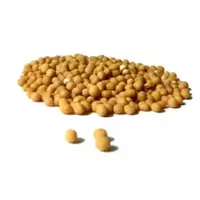Mustard white (english)

Mustard white or English mustard (Sinapis alba) belongs to the genus of herbaceous plants under the general name mustard. The name white mustard (English) speaks of the color of the plant's seeds. Usually the white mustard plant reaches no more than 100 cm in length. The stem of the plant often has few leaves. Mustard blooms in white (English) small inflorescences that consist of pale yellow flowers. Once the mustard is white, the pod-like fruits appear, which contain the white seeds of the plant.
The motherland of mustard of the white subspecies is considered the Mediterranean region. Currently, white mustard (English) can be found in wild form in the states of Southern Europe (Greece, France, Italy, Portugal, Spain), as well as in the West Asian and North African regions. In the territory of the Russian Federation, a weedy variety of white mustard grows. This means that the seeds of such a plant are not used as a food or drug.
The chemical composition of white mustard seeds contains a fairly large amount of fatty and essential mustard oils. In addition, white mustard (English) contains such mineral natural compounds as sinalbin, proteins of natural origin and the enzyme mirosine. The exceptional benefits of white mustard seeds for the human body are the content of such natural natural amino acids as linoleic, arachine, linolenic, erucic, palmitic and oleic. From white mustard seeds, essential mustard oil is obtained, which is used in the production of medicines and cooking.
Well-known mustard patches are made from white (English) mustard seeds. The benefits of white mustard in the treatment and prevention of rheumatism, hypertension, digestive disorders and sclerosis have been scientifically proven. Mustard white is able to help in the treatment of complex diseases of the liver, gallbladder, cutaneous eczema and sciatica. The beneficial properties of white mustard (English) have long been discovered by humans and have been successfully applied in practice. Mustard seeds of white or English are used not only as a medicine, but also as a spice.
Usually mustard seeds are ground into powder and used with spice mixtures. In some countries, such as India, green mustard leaves are eaten white. However, most often in cooking, as well as in medicine, essential mustard oil and plant seeds are used. Mustard oil is used in the manufacture of bakery products, as well as in the process of preservation. White mustard powder or whole seeds are added to soups, as well as meat, fish or vegetable dishes. The taste and aroma of white mustard is slightly inferior in saturation and strength to black or Sarept mustard. However, it is precisely in the softness and sophistication of taste that the main highlight of the product lies.
mustard white (English) 271 kCal
The energy value of mustard is white (English) (Ratio of proteins, fats, carbohydrates - ju):
Proteins: 37.1 g (~ 148 kCal)
Fats: 11.1 g (~ 100 kCal)
Carbohydrates: 5.9 g (~ 24 kCal)
Energy ratio (bj | y): 55% | 37% | 9%
 Español
Español Français
Français Português
Português Русский
Русский 简体中文
简体中文 繁體中文
繁體中文 日本語
日本語 한국어
한국어 العربية
العربية Türkçe
Türkçe Қазақ
Қазақ Deutsch
Deutsch Italiano
Italiano Українська
Українська
